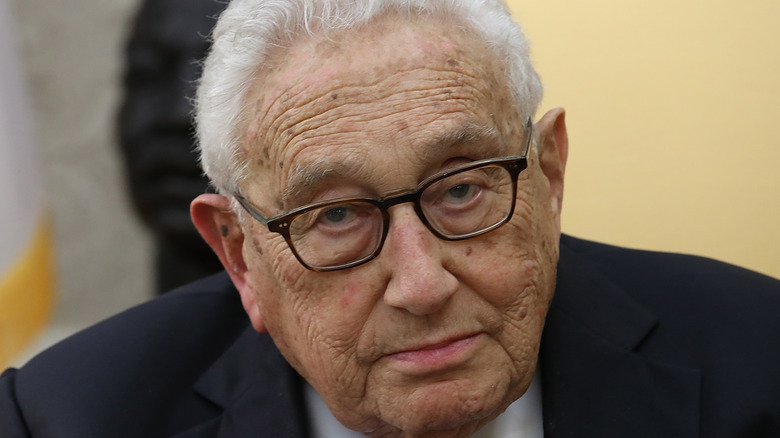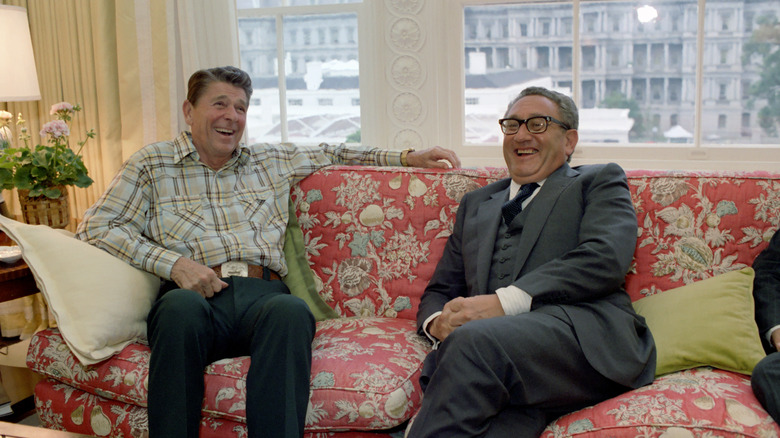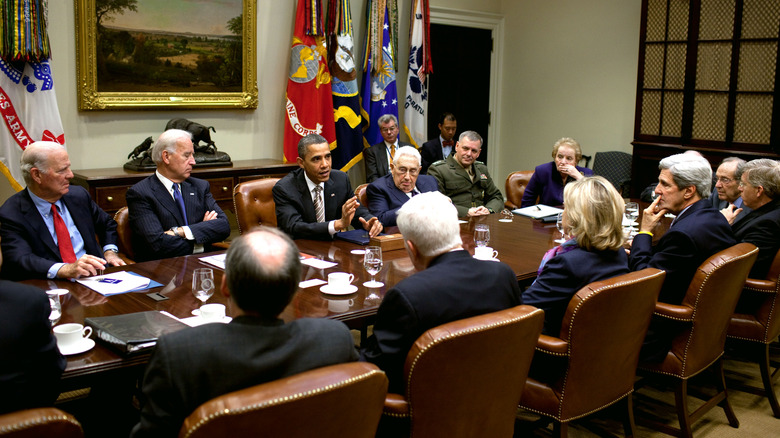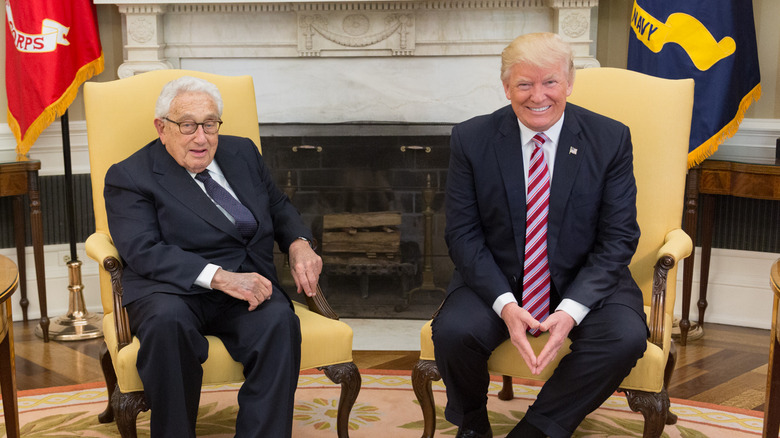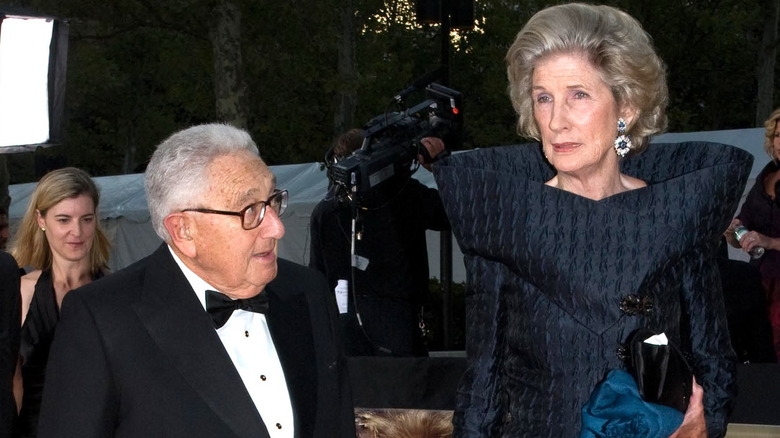Henry Kissinger, Diplomat And Statesman, Dead At 100
U.S. statesman and controversial advisor to multiple generations of presidents, Henry Kissinger, has died. He was 100 years old (via The Washington Post).
It's no exaggeration to say that Henry Kissinger was one of the most preeminent, influential, and controversial statesmen in recent U.S. history. Over the course of his 60-plus-year political career, Kissinger and his brand of realpolitik advised practically every U.S. president from John F. Kennedy to Joe Biden. Considered a war criminal by some for his involvement in prolonging the Vietnam War by four years, from 1969 to 1973, he also helped bring about the war's ultimate end (via Biography). He won a Nobel Peace Prize in 1973 for doing so, and then helped bring Cambodia's bloodthirsty Khmer Rouge regime to power in 1975 following a secret bombing campaign that he himself initiated. These are but a few actions that forged Kissinger's highly divisive public persona.
Born into the practicalities of politics
Henry Kissinger was born Heinz Alfred Kissinger in 1923 in Fürth, Germany to an Orthodox Jewish, well-to-do family, as Biography tells us. By all accounts, Kissinger was a studious, quiet, and also rebellious child who contended with daily anti-Semitism amidst Germany's post-World War I nationalist fever. Come 1938, Kissinger's family grew wary of the direction their country was headed, and fled to New York City. Kissinger was 15 at the time. Five years later in 1943, after excelling in school, learning English, and becoming a U.S. citizen, Kissinger was back in Germany in the U.S. Army as an intelligence officer during World War II. These experiences formed the backbone of Kissinger's political outlook, and steered him over the course of his career.
Back in the U.S. after World War II, Kissinger enrolled at Harvard University, where he finished his doctorate in 1954. That year he became a faculty member at Harvard in the Department of Government, got tenure in 1959, and remained in this role until 1969. Kissinger, who proved as practical as his politics, had always eyed real-world opportunities to affect policymaking. While teaching at Harvard he served as special advisor to John F. Kennedy and Lyndon Johnson on foreign policy from 1961 to 1968. Come 1969, President Nixon appointed Kissinger to be his national security advisor. As the BBC says, Kissinger was instrumental in opening diplomatic relationships with communist China and the Soviet Union.
Skeptical of peace, wary of power
Henry Kissinger was extremely active in U.S. policymaking throughout the 1970s. In addition to helping to advance relationships with the Soviet Union and China, he pushed for Arab-Israeli peace through the creation of a U.S.-led order in the Middle East, as the Atlantic explains. At the same time, he advocated restraint in pursuing American democratic ideology abroad, as well as restraint in using physical force to achieve American ends. However, he also strongly believed that the U.S. needed to stay heavily involved in geopolitics, if only to protect itself and ensure its own power. All in all, Kissinger was a realist, a balance-of-power proponent, a pragmatic optimist, and a skeptic of peace all rolled into one.
Even judging by these tenets alone, it's easy to see why Kissinger has always been such a divisive figure. New Yorker editor Nicholas Thompson called him "one of the worst people ever to be a force for good" (via Politico). A former military comrade called him "more American than I have ever seen any American" (via the New Yorker). Others praise his "caution, skepticism, agility, creativity, resoluteness, and guile in the service of a strategy."
Following the drafting of the Sinai Interim Agreement in 1975, which paved the way for peace between Israel and Egypt, Kissinger left politics to teach at Georgetown University. As the BBC describes, he returned in 1985 when he was appointed to President Reagan's Foreign Intelligence Advisory Board.
In support of, and opposition to, presidential power
Henry Kissinger was vocal in his disapproval of the Reagan administration even while employed by it. As the The New York Times reported in 1982, he openly criticized "the Western reaction" to Poland's desire to democratize. As Kissinger said, "It would ultimately have served the cause of negotiations far better had the United States, early in the Polish crisis, declared a moratorium on high-level contacts with the Soviet Union until martial law was lifted in Poland, the Solidarity leaders were released, and the military rulers began some form of discourse with the Church and the Union." This quote embodies Kissinger's clear, procedural vision for geopolitics.
This was not the first time Kissinger stood in opposition to a standing president, however, as Politico outlines. In 1978, the Carter administration ordered the extradition to the U.S. of three Chilean intelligence agents accused of orchestrating the assassination of a Chilean dissident working in the nation's capital. Kissinger, with no official government position at the time, met privately with Chilean Foreign Minister Hernan Cubillos and advised him to react to the Carter administration "with brutality," saying it was "the only language they understand."
And yet, come the Reagan and Bush, Sr. administrations from 1984 to 1990, Kissinger remained gainfully employed on the President's Foreign Intelligence Advisory Board (via Biography). Then, following the 9/11 terrorist attacks on the World Trade Center, President George W. Bush appointed Kissinger to chair an independent inquiry into the attacks.
An active late life and shadowy legacy
Henry Kissinger remained active in politics into his 90s. When Donald Trump was elected president in 2016, for instance, Kissinger stated that U.S. presidents such as Obama were too passive in regards to their foreign policy, as well as "burdened by the alleged sins of the past," as PBS states. In this article, Kissinger was likened to a specter in the room of political discussions even if he wasn't there. During the Russian invasion of Ukraine in 2022, he stated in Financial Times, "I think the geopolitical situation globally will undergo significant changes after the Ukraine war is over." He also stated that the U.S. will have to think in terms of its balance of power with Russia and China, saying, "I think it is unwise to take an adversarial position to two adversaries in a way that drives them together."
In Kissinger's personal life, he was married twice and had two children with his first wife, Ann Fleischer. Kissinger was married to his second wife, Nancy Kissinger, from 1972 until his death.
Now that Henry Kissinger is gone, it might be possible to gain a better perspective on his role in history, international policymaking, and how he should be regarded in the future. His impact was so thorough, though, regardless of anyone's personal opinion of him, that objectivity may take some time. In the end, it might just prove impossible to separate the United State's political identity from his shadow.
